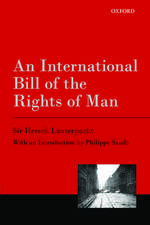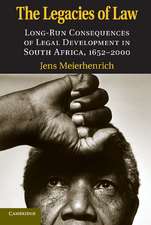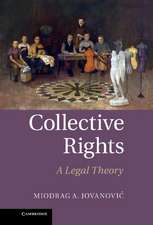The Israeli Supreme Court and the Human Rights Revolution: Courts as Agenda Setters
Autor Assaf Meydanien Limba Engleză Paperback – 29 mai 2013
| Toate formatele și edițiile | Preț | Express |
|---|---|---|
| Paperback (1) | 331.67 lei 6-8 săpt. | |
| Cambridge University Press – 29 mai 2013 | 331.67 lei 6-8 săpt. | |
| Hardback (1) | 723.09 lei 6-8 săpt. | |
| Cambridge University Press – 24 iul 2011 | 723.09 lei 6-8 săpt. |
Preț: 331.67 lei
Nou
Puncte Express: 498
Preț estimativ în valută:
63.47€ • 66.57$ • 52.83£
63.47€ • 66.57$ • 52.83£
Carte tipărită la comandă
Livrare economică 01-15 aprilie
Preluare comenzi: 021 569.72.76
Specificații
ISBN-13: 9781107674837
ISBN-10: 1107674832
Pagini: 222
Ilustrații: 7 b/w illus. 3 tables
Dimensiuni: 152 x 229 x 12 mm
Greutate: 0.3 kg
Editura: Cambridge University Press
Colecția Cambridge University Press
Locul publicării:New York, United States
ISBN-10: 1107674832
Pagini: 222
Ilustrații: 7 b/w illus. 3 tables
Dimensiuni: 152 x 229 x 12 mm
Greutate: 0.3 kg
Editura: Cambridge University Press
Colecția Cambridge University Press
Locul publicării:New York, United States
Cuprins
1. Introduction; 2. The intervention of the Israeli High Court of Justice in government decisions: an empirical, quantitative study with paradoxical results; 3. Law and politics: theoretical aspects; 4. The Supreme Court as a political entrepreneur in the process of institutional change - an analysis based on shared mental models and political entrepreneurship; 5. Israeli public law; 6. Israel in light of structural and cultural variables; 7. The Supreme Court and the political system in light of social and political processes in Israel during 1948–99; 8. The struggle for a new conservative constitutional court (2000): redefining the guarantor of human rights in Israel - the role of the Israeli Supreme Court; 9. The rule of 'who governs' as electoral capital (1999–2007): the Supreme Court as an agenda setter in Israel; 10. The Supreme Court of Israel as an agenda setter: three cases; 11. On law, society and policy design - towards a reform in the relationship between the High Court of Justice and the Knesset; 12. Conclusion and normative implications.
Recenzii
"This important book takes uses quantitative empirical analysis backed by qualitative case studies to carefully examine the role that the Israeli High Court of Justice has played in Israel’s political life. The important findings demonstrate the corelationship between the HCJ and other actors in the political system."
- Jeffrey Segal
Distinguished Professor and Chair, Department of Political Science, Stony Brook University
"An important increment to an important subject, which may prove useful for Israel studies students as well as for those engaging in pure comparative work within the subfield of public law."
- Amnon Rubinstein
Professor of Law, Interdisciplinary Center (IDC) Herzliya, 2006 Israel Prize Winner for the Study of Law
"In this innovative study the author analyzes the role of Israeli supreme court in social and political engineering by initiating institutional changes in Israel. Meydani successfully develops an interdisciplinary approach to the study of public law, politics and policy."
- Shimon Shetreet
Greenblatt Professor of Public and International Law, The Faculty of Law, The Hebrew University of Jerusalem, Israel
"The Israeli Supreme Court and the Human Rights Revolution is a marvelous book. Not only will it inform future accounts of this fascinating Court, it will serve as a foundational resource for all work examining the role courts play in their societies."
- Lee Epstein
Provost Professor of Law and Political Science & Rader Family Trustee Chair in Law, University of Southern California
- Jeffrey Segal
Distinguished Professor and Chair, Department of Political Science, Stony Brook University
"An important increment to an important subject, which may prove useful for Israel studies students as well as for those engaging in pure comparative work within the subfield of public law."
- Amnon Rubinstein
Professor of Law, Interdisciplinary Center (IDC) Herzliya, 2006 Israel Prize Winner for the Study of Law
"In this innovative study the author analyzes the role of Israeli supreme court in social and political engineering by initiating institutional changes in Israel. Meydani successfully develops an interdisciplinary approach to the study of public law, politics and policy."
- Shimon Shetreet
Greenblatt Professor of Public and International Law, The Faculty of Law, The Hebrew University of Jerusalem, Israel
"The Israeli Supreme Court and the Human Rights Revolution is a marvelous book. Not only will it inform future accounts of this fascinating Court, it will serve as a foundational resource for all work examining the role courts play in their societies."
- Lee Epstein
Provost Professor of Law and Political Science & Rader Family Trustee Chair in Law, University of Southern California
Notă biografică
Descriere
This book explains the reciprocal relations between the Supreme Court and the Israeli political system.














